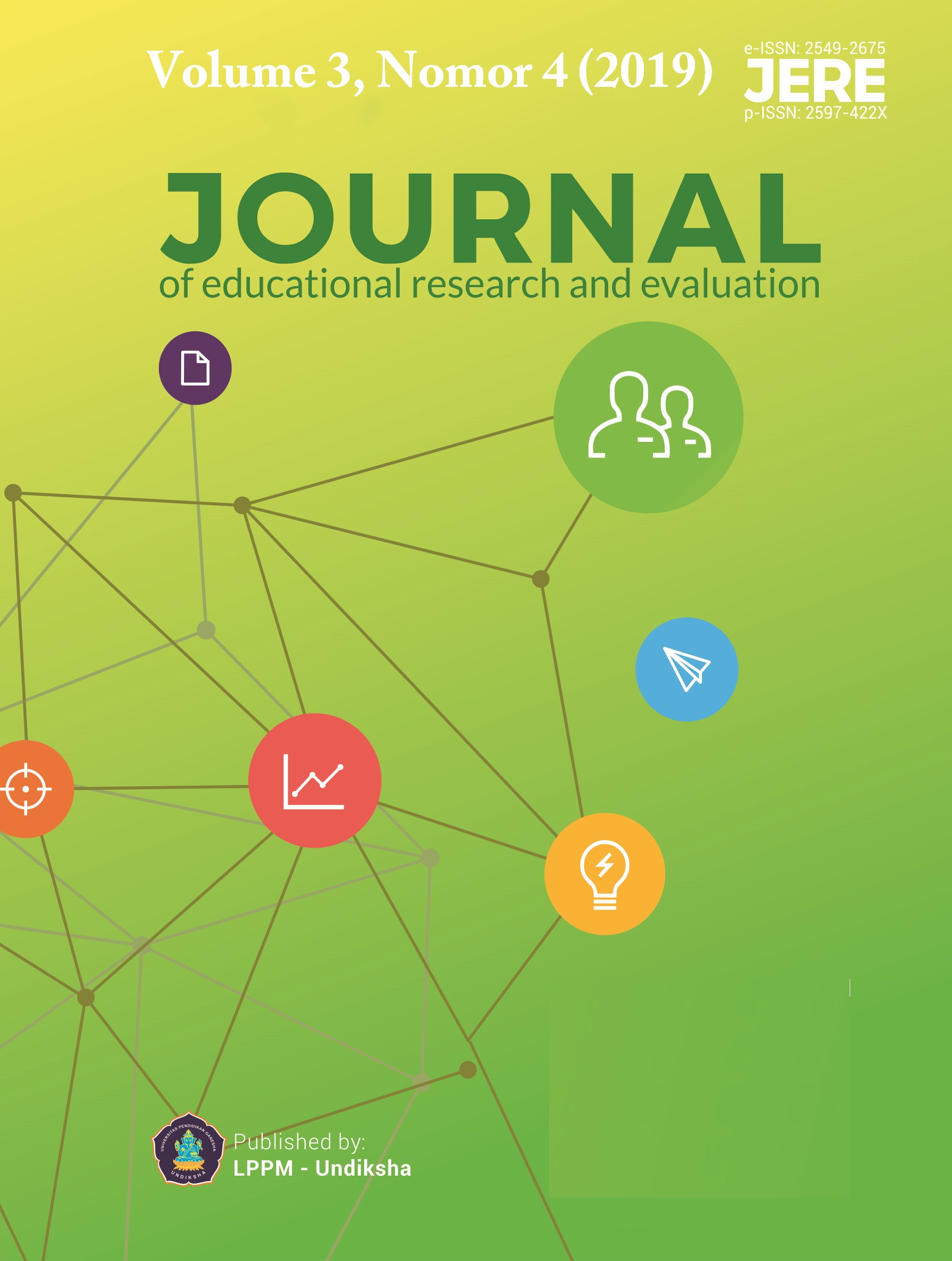English Teacher Identity in The Context of Zoning Policy Implementation
DOI:
https://doi.org/10.23887/jere.v3i4.23203Keywords:
English teachers, teacher identity, zoning policy, high-performing school, low-performing schoolAbstract
Teacher identity still remains an important topic to discuss in education because it shows teachers’ personal and professional aspects. Teacher identity is not a static circumstance as it changes depending on the contexts. As zoning policy in new student admission in Indonesia remains as educational current issue, this study aims to explore how the zoning policy implementation develops English teacher identity in high and low-performing schools. This study employed qualitative approach as the purpose of this research is not to be generalized; this empirical research is aimed to reveal holistic discussion of particular subjects instead. Twelve English teachers from different public senior high schools in Yogyakarta Province, Indonesia were selected for semi-structured interviews and two of them were invited to have in-depth interviews. The data were coded and analyzed based on the framework of teacher identity construction. The results showed that the contribution of zoning policy implementation in teacher identity development varied. Firstly, zoning policy implementation influences teacher identity regarding their beliefs on students’ characteristics in high and low-performing schools. Secondly, teachers’ maintenance of their moral purpose as educator was developed through the implementation. Thirdly, class dynamics were triggered by the previous two aspects
References
Adiputra, A. R., Karsidi, R., & Haryono, B. (2019). Stakeholders’ perception about zoning system of new students enrollment programme (PPDB) at SMA Negeri 2 Sukoharjo in the academic year 2018/2019. In Seminar Nasional Pendidikan KALUNI (Vol. 2, pp. 466–479).
Ali, K., Bakar, A., Supriyati, Y., & Hanafi, I. (2019). Evaluation of Admission Student Policy based on Zoning System for Acceleration Education Quality in Indonesia. Journal of Management Info, 6(2), 19–24. https://doi.org/10.31580/jmi.v6i2.883.
Amirin, T. M., Wijayanti, W., & Safruddin, C. (2016). Kondisi insani dan material sekolah menengah negeri “pilihan kedua” di kota Yogyakarta. Jurnal Penelitian Ilmu Pendidikan, 9(1), 1–11.
Ary, D., Jacobs, L. C., & Sorensen, C. K. (2010). Introduction to Research in Education (8th ed.). Wadswoth: Cengage Learning. Retrieved from https://books.google.co.id/books?id=FqF7n0zGJm0C
Bahr, N., & Mellor, S. (2016). Australian Education Review: Building quality in teaching and teacher education. Victoria: Australian Council for Educational Research Press. Retrieved from www.acer.edu.au/aer.
Bintoro, R. F. A. (2018). Persepsi masyarakat terhadap implementasi kebijakan zonasi sekolah dalam penerimaan peserta didik baru (PPDB) tingkat SMA tahun ajaran 2017/2018 di kota Samarinda. Jurnal Riset Pembangunan, 1(20), 48–57.
de Boer, H., Timmermans, A. C., & van der Werf, M. P. C. (2018). The effects of teacher expectation interventions on teachers ’ expectations and student achievement : narrative review and meta-analysis. Educational Research and Evaluation An International Journal on Theory and Practice, 3611, 180–200. https://doi.org/10.1080/13803611.2018.1550834.
Hoerudin, C. W. (2019). Evaluation of new student admission policy based on zonation system in Bandung City. JISPO, 9(2), 351–361.
Hong, J., Francis, D. C., & Schutz, P. A. (2018). Research on Teacher Identity : Common Themes , Implications , and Future Directions, 243–251.
Kaplan, A., & Garner, J. K. (2018). Teacher identity and motivation: The dynamic systems model of role identity. In Research on Teacher Identity (pp. 71–82). Springer.
Pennington, M. C., & Richards, J. C. (2016). Teacher Identity in Language Teaching : Integrating Personal , Contextual , and Professional Factors. RELC Journal, 1–19. https://doi.org/10.1177/0033688216631219.
Perdana, N. S. (2019). Implementasi PPDB zonasi dalam upaya pemerataan akses dan mutu pendidikan. Jurnal Pendidikan Glasser, 3(1).
Richardson, P. W., & Watt, H. M. G. (2018). Teacher professional identity and career motivation: A lifespan perspective. In Research on Teacher Identity (pp. 37–48). Springer.
Rubie-davies, C. M., Flint, A., & Mcdonald, L. G. (2012). Teacher beliefs , teacher characteristics , and school contextual factors : What are the relationships ?, 270–288. https://doi.org/10.1111/j.2044-8279.2011.02025.x.
Viskovic, A., & Robson, J. (2001). Community and Identity: experiences and dilemmas of vocational teachers in post-school contexts. Journal of In-Service Education, 27(2), 221–236.
Downloads
How to Cite
Issue
Section
License
Authors who publish with the Journal of Evaluation and Research in Education (JERE) agree to the following terms:
- Authors retain copyright and grant the journal the right of first publication with the work simultaneously licensed under a Creative Commons Attribution License (CC BY-SA 4.0) that allows others to share the work with an acknowledgment of the work's authorship and initial publication in this journal.
- Authors are able to enter into separate, additional contractual arrangements for the non-exclusive distribution of the journal's published version of the work (e.g., post it to an institutional repository or publish it in a book), with an acknowledgment of its initial publication in this journal.
- Authors are permitted and encouraged to post their work online (e.g., in institutional repositories or on their website) prior to and during the submission process, as it can lead to productive exchanges, as well as earlier and greater citation of published work. (See The Effect of Open Access)











